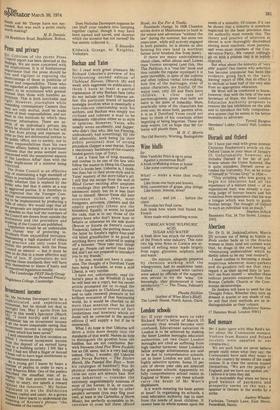Buchan and Yates
Sir: I read with great pleasure Mr Richard Usborne's preview of his forthcoming second edition of Clubland Heroes, (March 16) and await with eagerness its publication. I think I have at least a partial explanation of why Buchan fans (who do not include me) find Usborne unfair. His particular brand of barbed nostalgia involves what is essentially a love-ridicule relationship with his authors, and Buchan was simply too civilised and tolerant a man to be adequately ridiculous either as to style or opinions. However, Yates, who usually wrote excellently, and Sapper, who didn't (but who, like Ian Fleming, undoubtedly had something) fill the bill admirably, (in their public personae) men of strong prejudices (Sapper a near-fascist, Yates a reactionary backbone-of-the-country landed-gentry type of Tory). I am a Yates fan of long standing, and confess be one of the few who follow the master in liking his Chandos and Co books best. Usborne is, I think, less than fair to their prose-style and to Yates' mastery of the story-teller's art. I still find the escape from the well in Blind Corner exciting after umpteen re-readings (but perhaps I have an adolescent mind), but he is less than fair to himself. Mercer-Yates did hate nouveaux riches, Jews, most foreigners, arrivistes, climbers and the uppity generally (these are the bounders). Equally, or worse, he hated the cads, that is to say those of the gentry-born who don't know how to behave or otherwise let the side down (Brevet or Estelle de Swete's cousin Frederick). Indeed, the putting down of the latter by Estelle's eighty-four-year old blind grandfather 1 as good as anything Berry ever achieved in seeing a bounder. "Now take your things
off
and go. People call earlier than they did, and I am not prepared to introduce you to my friends." I, for one, would not have it otherwise. The thought of a Dornford Yates hero being a Socialist, or even a mild Liberal, is very terrible.
I have not, unfortunately, read Usborne's piece in the Windmill (I hope he will lend me a copy), but his recent article prompted me to re-read the
• Yates chapters in Clubland Heroes, and to take renewed pleasure in his brilliant evocation of that fascinating world. So it would be churlish to do more than mention that he does perpetrate several errors of fact (sometimes real howlers) which no doubt will be corrected in the second edition (I will supply a list if he is interested). What I do hope is that Usborne will delve a little more deeply into the standards of that world. Names do help to distinguish the goodies from the baddies, but are not conclusive: Berwick Perowne (And Five Were Foolish) has an OK name, but is a very bad egg indeed. (Why, I wonder, did Usborne omit Porus Bureau — The Stolen March, She Painted Her Face — from his catalogue of baddies?) Nor do physical characteristics help, though close-set eyes are always bad. Nor even behaviour — consider the extremely ungentlemanly nosiness of most of the heroes. It is, or course, unforgiveable to be rude to other people's servants (you may flog your own, at least in the Carinthia of Storm Music), but perfectly acceptable to incarcerate or even kill them (Blood
Royal, An Eye For A Tooth). Royal, An Eye For A Tooth).
Standards change. In 1926 Chandos settles down at Maintenance to hunt in the winter and adventure "without the law" during the summer, but some ten years later , while still actively engaged in both pursuits, he is shown as also farming his own land (a worthier farmer ne'er brushed Jew from lawn). If there are many ambivalences about class, what about sex? Lower than Vermin excepted (and this, like This Publican, is a "real-life" book and thus outside the regular mystique) it is quite incredible, in spite of the copious and often tedious verbal love-making, how few of the marriages, even of minor characters, are fruitful. Of the major ones, only Jill and Piers have children, a clear case of parthenogenesis, given that both are naive to the point of imbecility. More, practically none of the characters has even one, let alone both, parents alive, it is as if Dornford Yates could not bear to think of his creations either begetting or being begotten. These are deep waters. Let us hope that Mr Usborne will plumb them.
The Old Rectory, Worting, Basingstoke


































 Previous page
Previous page